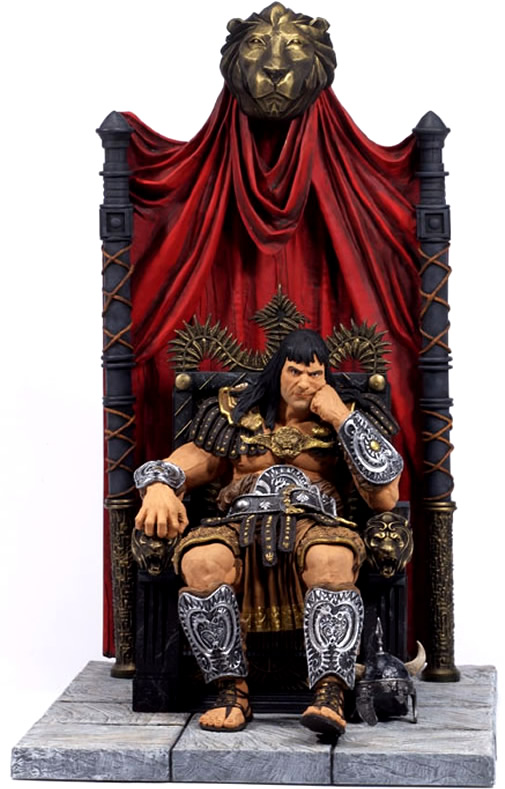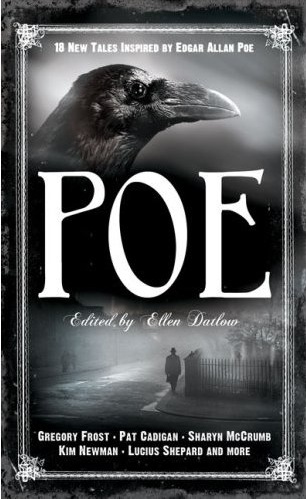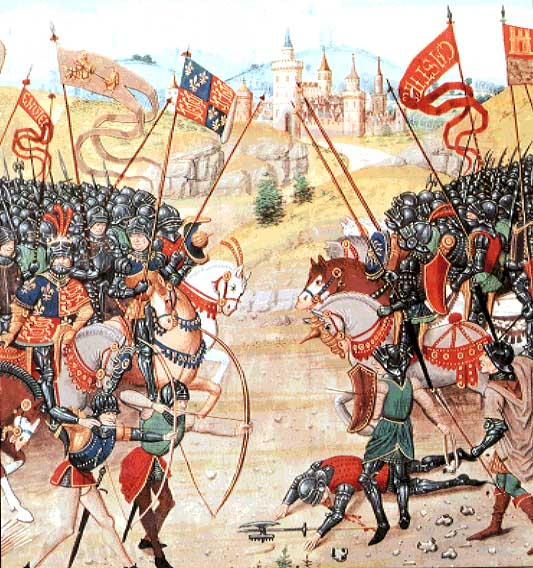He’s Not a Barbarian, He’s Just Drawn That Way
Thursday, January 29, 2009
posted by Steve Tompkins
 Print This Post
Print This Post

Kibbles ‘n’ bits, quibbles and snits this morning, beginning with the Dark Party Review site’s chat with Joakim Zetterberg of Paradox Entertainment. It is soon apparent that Howardian English is not Mr. Zetterberg’s first language, as he describes Conan as “strong as an oxe [sic], yet quick as a panther.” Things really fall off a Cimmerian cliff when he’s asked to debunk “the single biggest misconception” about the character:
While stuck with the epithet “Barbarian” I find him being far from it. Yes, he beats up quite a lot of people but we all know they deserve it. He has a very straight-forward moral code which is easy to understand. He does what he has to do to survive which is more or less a combination of common sense and taking matters into his own hands. He only makes a couple of moral sidesteps with today’s standards, like when he needs money for food. But barbarian, nope.
Zetterberg might merit the benefit of the doubt here –he’s presumably trying to banish the stereotype of the monosyllabic-and-Germanically-accented fur jockstrapper — but as gormless as their efforts were, even L. Sprague de Camp and Lin Carter never decoupled Conan from that conceptual be-all and end-all for REH the barbarian. “He beats up quite a lot of people” and the rest of the answer really suggest some sort of caped crusader. Please stop, or at least coach, this man before he’s interviewed again.
Meanwhile The Onion would seem to have been hiding under the bed during the new administration’s honeymoon in order to produce “Obama Disappointed Cabinet Failed to Understand His Reference to Savage Sword of Conan #24.” If genius is indeed an infinite capacity for taking pains, this article is a work of genius, getting all the details of a standout SSOC right. Serendipitously enough, Brian Murphy was just extolling that selfsame issue at The Silver Key. The Onion namechecks Roy Thomas rather than REH, but a direct Howard quote makes up for that:

How am I supposed to effectively lead this nation when [attorney general nominee Eric] Holder has to stop the meeting and ask what the story of Taurus using the black lotus powder to kill the five guard lions has to do with increasing broadband Internet connections nationwide?” Obama said while vigorously rubbing his temples.
Added the president, “For the love of Crom, am I the only one here who wants to keep the U.S. technologically competitive?”
Administration officials said the incident has caused the president to question whether his staff has ever understood any of his Conan references. One such instance he is reportedly reexamining occurred after his loss in the New Hampshire primary, when Obama rallied his staff by reminding them, “There is always a way, if the desire be coupled with courage.”
Although campaign workers smiled and nodded at the time, Obama has begun to seriously doubt that any of them connected the inspiring quotation to the story line in which a Kothian rogue informs Conan that it is impossible to climb to the top of the Elephant Tower because the sides are more slippery than glass.
On the sandaled heels of the Sheldor the Conqueror episode of The Big Bang Theory, this is actually pop culture exposure for Howard that isn’t as painful as swallowing a rusty yataghan.
As part of his “Celebrating 103 Years of REH” at the Black Gate blog, Scott Oden encourages visitors to list their three favorite Howard stories, and leads off himself. We’ve all seen any number of such beauty contests before, but Scott’s first selection made me sit up and take notice, given what the next Rusty Burke-edited Del Rey release is going to be:
3.) The Country of the Knife
One of REH’s tales of Francis Xavier Gordon — known to friend and foe alike as El Borak, the Swift. One passage near the beginning of the story never fails to send a thrill of anticipation down my spine: “Outside, the fog curled and drifted, beading the pane. Pictures formed for him there-prophetic pictures of an East different from the colorful civilized East he had touched in his roamings. Pictures not at all like the European-dominated cities he remembered, exotic colors of veranda-shaded clubs, soft-footed servants laden with cooling drinks, languorous and beautiful women, white garments and sunhelmets. Shiveringly he sensed a wilder, older East; it had blown ascent of itself to him out of the fog, over a knife stained with human blood. An East not soft and warm and exotic-colored, but bleak and grim and savage, where peace was not and law was a mockery, and life hung on the tilt of a balanced blade.”
In a better world, longest-serving REHupan (he tired of “Trout in the Dark” jokes untold ages ago) Steve Trout would be blogging his own self. Two recent posts here motivated him to contact Leo Grin:
But I was a little dismayed to see [Tompkins’] Poe pieces neglect Marc Olden’s Poe Must Die, in which the hapless poet becomes a reluctant Brule as a vengeful cop tracks a demonic sorceror, and his latest Worms piece with its mention of Jenny Greenteeth makes me wonder if he’s encountered Cecilia Dart-Thorn’s Bitterbynde trilogy, which though basically chick-flic fantasy, is a compelling read featuring many such legendary characters.
My only defense is that with Poe, infinity always gapes in front of us. I also neglected to mention Jack Torrance in The Shining, who when a “Masque of the Red Death” allusion occurs to him automatically rejects it, thinking “That was Poe, The Great American Hack.” Snobbery that should have earned him dismemberment by the Overlook’s topiary-beasts. Nor did I include the Michael Connelly-edited In the Shadow of the Master, which pairs Poe classics with afterwords by genre mavens; Stephen King stethoscopes “the Tell-Tale Heart.” Or The Mystery Writers of America’s On a Raven’s Wing: New Tales in Honor of Edgar Allan Poe. Or the Ellen Datlow-edited Poe: 19 New Tales Inspired by Edgar Allan Poe; the presence in this one of contributors like Kim Newman and Lucius Shepard has me pre-sold.

For Bossonian archer wannabes, at the Wall Street Journal site Ronald F. Maxwell takes a look at Bernard Cornwell’s new novel Agincourt. This book’s arrival has been a clothyard shaft in my heart because I was counting the nanoseconds until the next installment of Cornwell’s Saxon Stories — The Last Kingdom (2004), The Pale Horseman (2005), The Lords of the North (2006), Sword Song (2007) — hit the stores. As much as I enjoy reading about highhanded Kothian and Nemedian chevaliers being pincushioned by the longbows of Aquilonia’s human palisade against the Picts, switch the setting to medieval France and I want the damn rosbifs chased back across the Channel. Nothing for it but to sulk and savor Henry VI Parts 1, 2, and 3, wherein the Plantagenets get theirs. Still, Maxwell’s review persuades me that I’ll break down and queue up Agincourt eventually:

In the space of a year, Hook has gone from the besieged to the besieger, from the defender to the attacker. Between the two encounters Mr. Cornwell paints a vivid, harrowing portrait of the ordeal of medieval warfare, with trebuchets, catapults, primitive cannon, vats of boiling oil and crossbow bolts — even the claustrophobic hell of an underground clash as two tunneling armies collide under the walls of Harfleur.
Until recently, most adolescent boys growing up in the Western world have had the dream of being a knight in shining armor, part of a world involving chivalry, damsels in distress, brightly caparisoned destriers, turreted and crenellated castle walls, tapestries, tournaments, broad swords. These elements are present in Mr. Cornwell’s story, but only as a thin outer layer that gets peeled away with every turn of the page. Here the medieval world transitioning to the Renaissance is much closer to Hobbes’s vision of humanity: “continual fear, danger of violent death; and the life of man, solitary, poor, nasty, brutish, and short.”
Mr. Cornwell does not over-adorn the splendor, opulence and high art of Europe at the beginning of the 15th century. But neither does he obscure its darker side: numbing cold, clawing hunger, savage hand-to-hand fighting, the burning of heretics, the arbitrariness of justice and the arrogance of power. Plus ça change, plus c’est la même chose.
Lastly, in an NYT story about the February 15 Anschluss of the dead-tree incarnation of the Book World section of the WaPo (bailiwick of the REH and CAS-touting Michael Dirda), we find this quote from David L. Ulin, the Los Angeles Times’ book editor:
But he asserted there were some advantages to having been moved into a broader section. “In a section where there are a variety of elements, there might be people who might not ordinarily look at book reviews who might now look at book reviews,” Mr. Ulin said. “One of the issues with book culture in general is it tends to be a garrison culture and identify itself as contrary to mainstream culture, and that in many ways is a self-defeating premise.” He added: “You could argue that putting books into the general mix opens more people to that conversation.”
For frack’s sake. Garrison culture? Gee, isn’t it true that garrisons are frequently stationed in hostile environments? No wonder the LAT is barely suitable for wrapping junkfish in.
